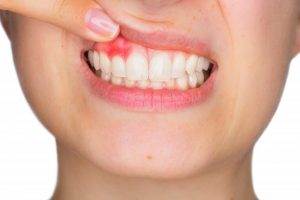 Are your gums sensitive? Do they bleed sometimes when you brush or floss? You could have gum disease in Piedmont. Don’t worry, this disease is a lot more common than you think. According to the Centers for Disease Control and Prevention, over half of Americans suffer from mild, moderate, or severe gum disease. Keep reading to learn what this disease is, what it looks like, how to prevent it, and what your treatment options are.
Are your gums sensitive? Do they bleed sometimes when you brush or floss? You could have gum disease in Piedmont. Don’t worry, this disease is a lot more common than you think. According to the Centers for Disease Control and Prevention, over half of Americans suffer from mild, moderate, or severe gum disease. Keep reading to learn what this disease is, what it looks like, how to prevent it, and what your treatment options are.
What is Gum Disease?
Gum disease is a chronic infection of the gums that can range from mild inflammation or sensitivity to severe gum damage and tooth loss if left untreated. Gum disease has also been linked to an increased risk of stroke and heart disease.
This disease starts in the space between your gumline and teeth. It causes inflammation and eventually damage of your tissue that makes your gums recede. The severity of the disease is measured by the depth of space or pockets that form on the gum line when they recede.
The leading cause of this disease is poor oral health habits like lack of brushing, flossing, and regular dental visits. Additionally, smoking and tobacco products can increase your chances of gum disease.
What Are the Signs of Gum Disease?
Now that you know what gum disease is, you should know what symptoms to look out for:
- You may have constant bad breath or a sour taste in your mouth.
- Your teeth fit together differently when you bite down.
- Your gums are bleeding or sensitive.
- Your gum tissue pulls away from your teeth.
- You may experience pain when chewing.
- Your teeth may appear longer.
- Your gums look swollen or tender.
If you’ve noticed any of these signs, talk to your dentist in Piedmont to get the treatment you need before the disease persists.
What Are My Treatment Options?
Gum disease can be treated in several ways, which will mostly be based on how severe its symptoms are. The main goal is to manage the infection that leads to tissue damage. Here’s some of your treatment options:
- Visit your dentist for regular professional deep cleanings to clear out the harmful bacteria from your gums.
- If gum disease has reached a moderate level where some of the tissue has been lost or damaged, scaling and root planing (SRP) may be the right treatment for you. Your dentist will use special tools to clean your gumline and smooth your tooth’s root to prevent reinfection.
- If gum disease has reached more severe stages, your dentist may recommend flap surgery. This procedure allows your dentist to remove infected tissue from around the tooth’s root.
Last but not least, your dentist will also provide expert advice on how to clean your gums and teeth at home to minimize your chance of damaging your gums and letting the disease get worse.
No matter what stage of the disease you may have, it’s important to visit your dentist to get the care you need. Being proactive in the early stages of this disease will save you from some of the more serious issues it can lead to.
About the Practice
Tylan Creek Family Dentistry has a team of highly trained dentists ready to help with any of your dental needs. They each bring their own set of skills to the practice, including restorative and cosmetic treatments. For any questions, they can be contacted through their website or by phone at (864) 962-6671.
